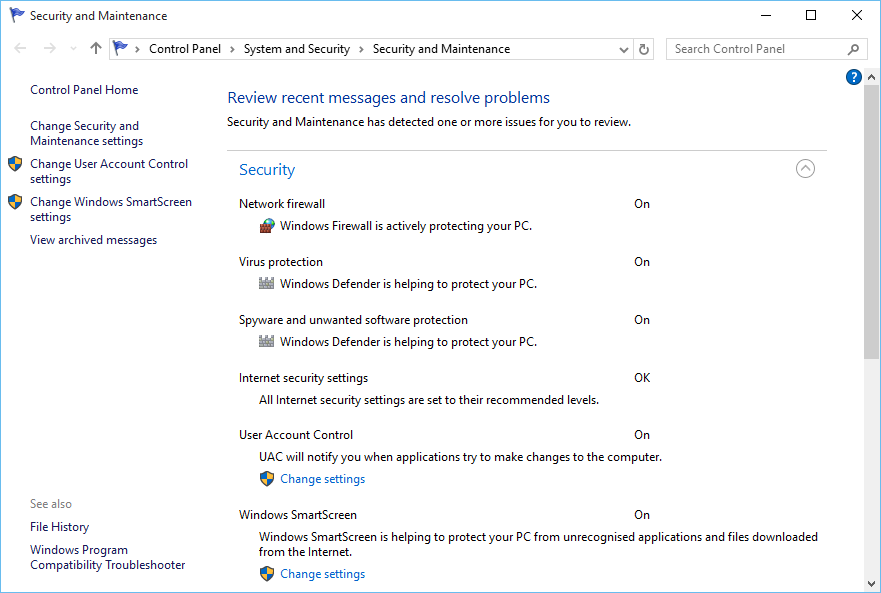So far in my “series” of Windows 10 posts, I’ve written about refreshing or resetting the PC (to get a clean configuration) and about getting an Office 365 Home subscription for some productivity apps but I skipped one area that many people are sold products for… security software.
Actually, this is one of my major bug-bears. In the enterprise, I often see third party security products used but there’s only one reason I can see for that: management. Not just of the updates, but of quarantine for any infections that are caught.
Unfortunately, in the consumer space anti-virus products are often foisted onto unsuspecting consumers. Both the PCs I’ve bought for family in recent years have come with McAfee products installed (removed soon afterwards) and high street PC shops/office suppliers/supermarkets will happily sell alternatives. I was particularly annoyed to see that, after my parents in-law went to a local “PC specialist” (because they thought I was too busy), Microsoft Security Essentials had been removed (from their Windows 7 PC) and replaced by AVG. Now, don’t get me wrong, there’s nothing wrong with AVG, except that, the last time I used the free version, it kept nagging to be upgraded to a paid one – and there’s simply no need to clog up the system with third party apps like this.
Reputable providers of consumer advice seem to be caught up in the trap too: I took a look at the Which? report for security software best buys and even their best free antivirus software guide doesn’t include the software built into the operating system – indeed it says:
“Two programs could interfere with one another causing problems. If you are installing a third party piece of security software make sure you uninstall Microsoft Defender.”
I’d put it a different way: don’t waste time and money on third party anti-virus software – just use Windows Defender!
- Windows Defender scans for malicious software. The schedule for scans can be edited in Task Scheduler.
- In Windows 10, Windows Defender is enabled by default. It will turn itself off if you install another antivirus application, but equally it can be left in place and will receive updates through the same mechanism as other Windows updates.
- If Windows Defender finds a virus it can’t remove, it will prompt to download and run Windows Defender Offline. Once the download is complete, the PC will automatically restart into the recovery environment, where Defender will run a more complete scan and remove threats.
Other security features built into Windows (avoiding the need for third party products) include Windows Firewall (which helps to protect a PC from damage caused by worms or hackers attacking across a network) and SmartScreen (a phishing and malware filter implemented in several Microsoft products including Internet Explorer, Microsoft Edge, and inside Windows).
Find out more about the security settings in Windows 10 by searching for Security and Maintenance.

WINDOWS DEFENDER- easily becomes disabled by malware, windows firewall also get pushed over easy, and horrible detection rate and lack the robust features needed for web filtering and it allows viruses to come in so there is a sad sad intrusion prevention setup..or reactionary type of system. What a mindless article in times where the real viruses out there send their droppers in with kernal mode rootkits that inject code into legitimate signed windows processes.
Do you have evidence to back this up Dave? It would be interesting to read if you do because I’d question how many “normal” users (i.e. not those who go searching the nefarious parts of the web for warez and the like) really fall foul to the types of issues you describe. And are the paid alternatives really any better? How many “normal” users suffer issues because McAfee/Kasperky/insert name of security vendor here have blocked a legitimate process? I’ve certainly had more of the latter when dealing with issues on family/friends PCs than the former. As I said in the blog post, enterprise IT is a different matter.